
The Ethics Education Fellowship is stepping into its second phase with ambitious new initiatives designed not only to broaden its reach and impact but also to establish a lasting foundation for sustainable change in education.
Launched in 2022 by Arigatou International, the Guerrand-Hermes Foundation for Peace, KAICIID International Dialogue Centre, the Higher Committee of Human Fraternity, and UNESCO, this program has already made a profound impact, reaching schools in Bangladesh, Indonesia, Kenya, Mauritius, Nepal, and Seychelles.
Through the support of local Ministries of Education and National Commissions for UNESCO, the fellowship has sparked a movement that uses the transformative power of education to promote core values such as empathy, mutual respect, solidarity, and reconciliation—values crucial for building peaceful, inclusive societies.
This second phase introduces innovative approaches, harnessing technology and digital tools to reach teachers and learners in remote areas, encouraging interactive engagement from learners., and significantly expanding the program’s reach.
With an active involvement from diverse stakeholders, the program is setting the stage for a future where ethics education is embedded into the educational system, ensuring its sustainability and relevance for generations to come.
Building on the success of its first phase, which saw 324 teachers trained and over 8,000 children reached, the second phase of the Ethics Education Fellowship is poised to scale up its impact and create a strong foundation for institutionalizing ethics education at the national level. With the formation of country committees, a strategic advocacy plan, and the launch of new training workshops, the program is setting the stage for a transformative shift in education.
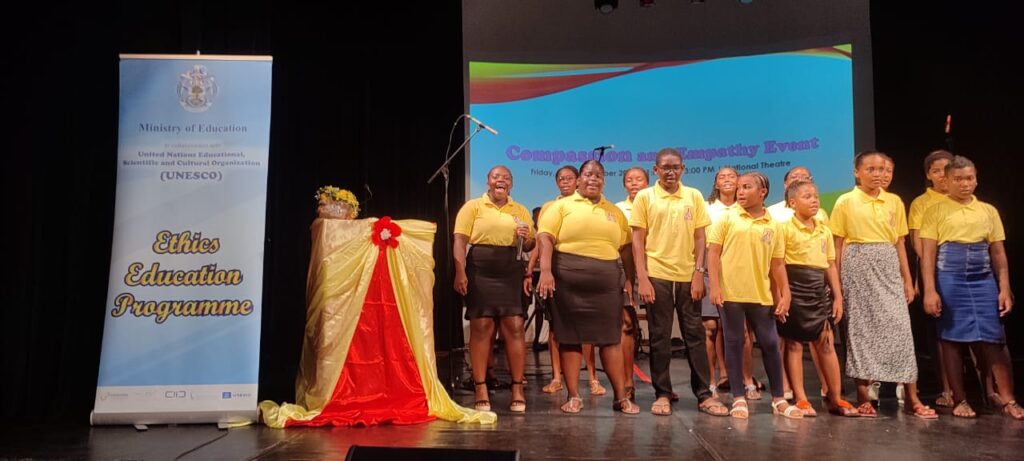
Bangladesh
In Bangladesh, the Directorate of Secondary and Higher Education has formed a Program Implementation Committee to drive coordination across the education sectors, setting the stage for an exciting new chapter of the program.
Children from the first phase of the Ethics Education Fellowship led impactful initiatives through their Ethics Clubs, such as raising funds for flood relief, cleaning school grounds, and planting trees. These actions not only helped their communities but also inspired their peers to take part, creating a ripple effect and fostering a sense of active citizenship. One student shared, “It is amazing to take part in such work. Of course, it is our responsibility to keep our premises clean, but when necessary, we should get down to work without hesitation.”
On 14 September 2024, fellows and teachers from Bangladesh met online to share progress, tackle challenges, and plan the next phase of the Ethics Education Fellowship. They discussed ongoing activities and innovative approaches to boost learner engagement. Reflecting on the program’s impact, Mr. Moinul from Pabna shared, “I am practicing ethics education regularly, and learners are happy,” highlighting the meaningful progress in fostering ethical values and enriching learning experiences.
The team of fellows in Bangladesh is preparing for the next National Teacher Training Workshop, set for 19-23 January 2025. This five-day workshop will bring together 48 new teachers from both madrasah and general schools, equipping them with the tools to further advance ethics education.
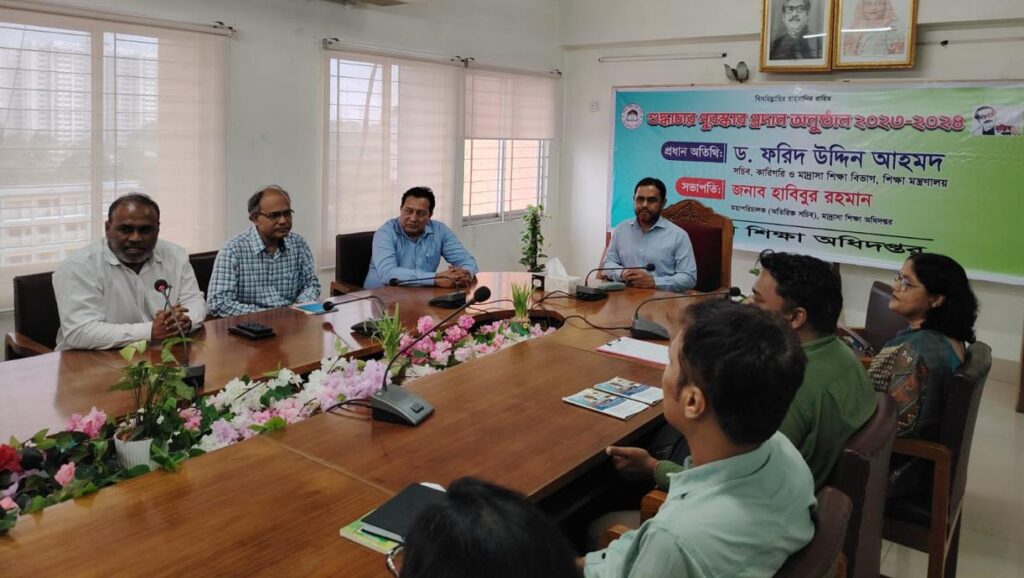
Indonesia
In Indonesia, the Ethics Education Fellowship is leveraging digital technology to expand its reach and deepen its impact. To make ethics education accessible to teachers nationwide, the Ministry of Basic and Secondary Education has developed three online learning modules. These modules, based on Arigatou International’s Teacher’s Activity Booklet, focus on three key dimensions of the Pancasila Student Profile: critical thinking, collaboration, and global diversity. Available in both Bahasa and English, the modules ensure that ethics education is integrated into the daily lives of students, aligning with the nation’s foundational ideology, Pancasila.
Since the launch of the second phase of the Fellowship program, 200 educators have participated in training workshops designed to empower them with the tools and skills to integrate Ethics Education into their school programs. With a strong focus on enhancing the Pancasila Student Profile, these workshops are not just about teaching—they’re about transforming how educators role model ethics, nurture critical thinking, and foster global citizenship diversity in the classroom.
By the end of the workshops, participants were fully equipped to design, implement, monitor, and evaluate tailored Ethics Education programs that meet the unique needs of their students.
Reflecting on the training’s impact, Mrs. Arlitasari shared, “Ethics Education plays an essential role in shaping future students. Through this training, I learned about children’s rights and how to incorporate these into the learning process to ensure they are fulfilled.” Mrs. Herawati added, “Ethics Education offers countless benefits, especially in creating a safe, child-friendly environment that fosters optimal learning outcomes—where the process is as important as the result.”
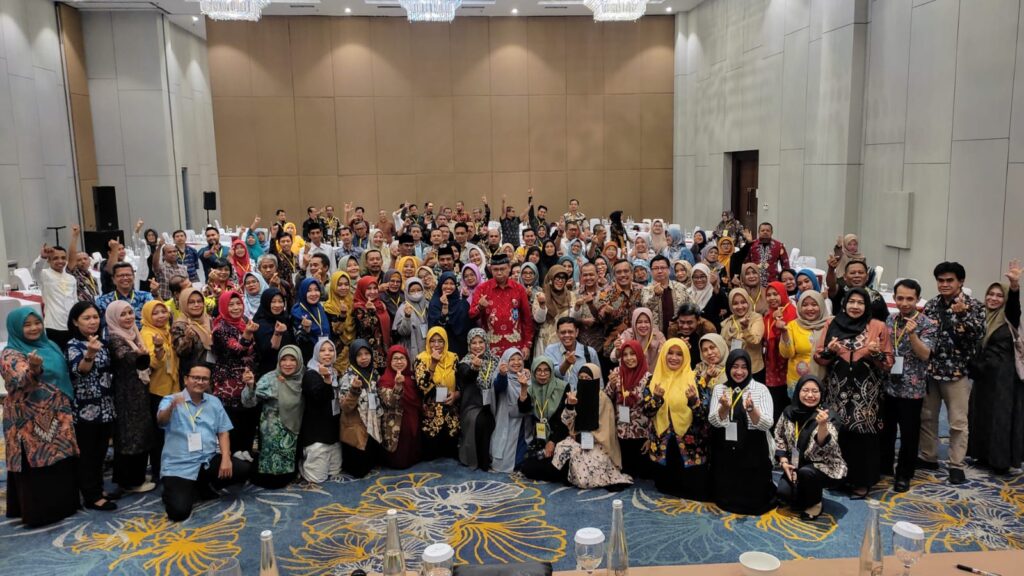
Kenya
The second phase of the Ethics Education Fellowship in Kenya was officially launched during the Stakeholder Forum on 30 August 2024, which brought together a diverse group of key stakeholders to discuss how to ensure the program’s sustainability, particularly its integration into the national curriculum. Hosted at the Kenyan Institute of Curriculum Development, the forum featured an online address by Ms. Maria Lucia Uribe, Executive Director of Arigatou International Geneva, who represented the Fellowship partners.
As the program moves forward, children from the first phase continue to lead by example through impactful initiatives. A standout example was the collaboration between the Ethics Club at KU Primary School and students from “Tree Side Special School,” a school for children with special needs. This special event not only promoted inclusion and empathy but also created lasting connections between students from different backgrounds, showing the power of shared experiences.
Additionally, the Fellowship’s influence reached new heights with the acceptance of a research paper at the prestigious International Conference at Kenyatta University. Titled “A Transformative Approach to Integrating Ethics Education into Teacher Training for Promoting Social Cohesion, Peace, and Inclusion in Kenya,” the paper, developed by Ms. Sanjanee Ambegoda, Ms. Eleonora Mura, and Mr. Francisco Vila from Arigatou International, alongside fellows Ms. Olivia Opere, Ms. Nelly Machu, and Ms. Mary Kangethe from UNESCO National Commission for Kenya, showcases the program’s ongoing commitment to shaping a more inclusive and peaceful society through ethics education.
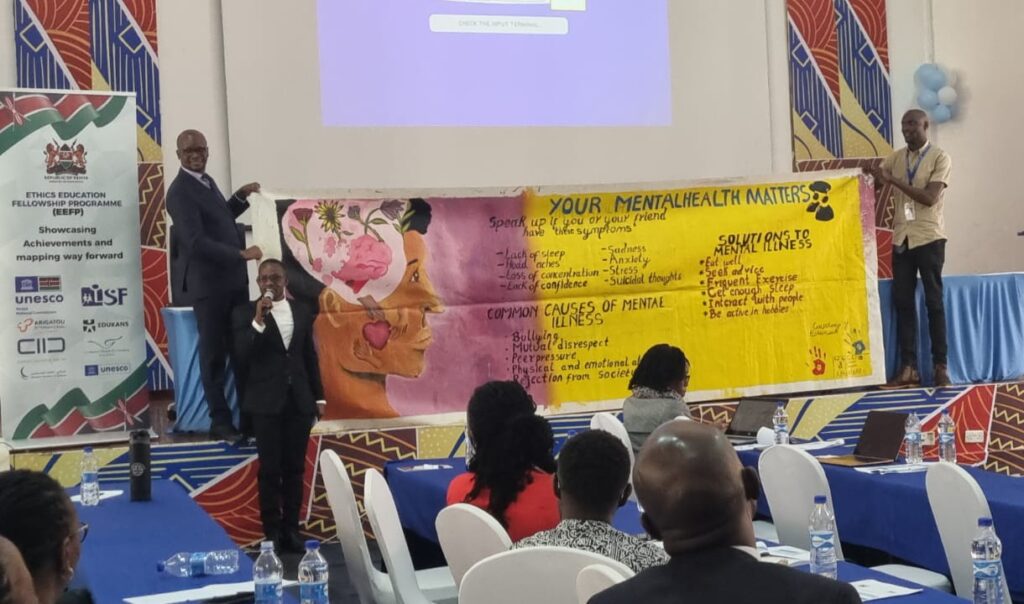
Mauritius
One of the most exciting developments in the second phase of the Ethics Education Fellowship in Mauritius is the inclusion of Rodrigues Island. While the program was previously focused solely on the main island due to Rodrigues’ remoteness and access challenges, this new phase expands the program to reach this important region.
During this period, the team in Mauritius also established a steering committee to oversee the second phase of the Fellowship, focusing on four key areas: (i) curriculum integration, (ii) the development and digitization of materials—including a Cultural Map, (iii) teacher training, and (iv) implementation at the school level.
The Cultural Map is a particularly innovative component of the program. Designed to highlight the historical, cultural, and religious significance of various locations across Mauritius, this interactive tool allows students to click on different places and learn about their importance. This creative approach aims to engage students in their local heritage while fostering a deeper connection to their community.
To ensure the success of the program, a stakeholders meeting was held with school heads and representatives from various institutions, where they were briefed on the achievements of the first phase and the goals for the second. The meeting was an invitation to contribute to the continued success and growth of the program.
Looking ahead, the team in Mauritius is preparing for a training workshop in early 2025, where 154 Life Skills and Social and Modern Studies teachers from 46 schools will come together to deepen their understanding of ethics education and learn how to integrate it into their classrooms.
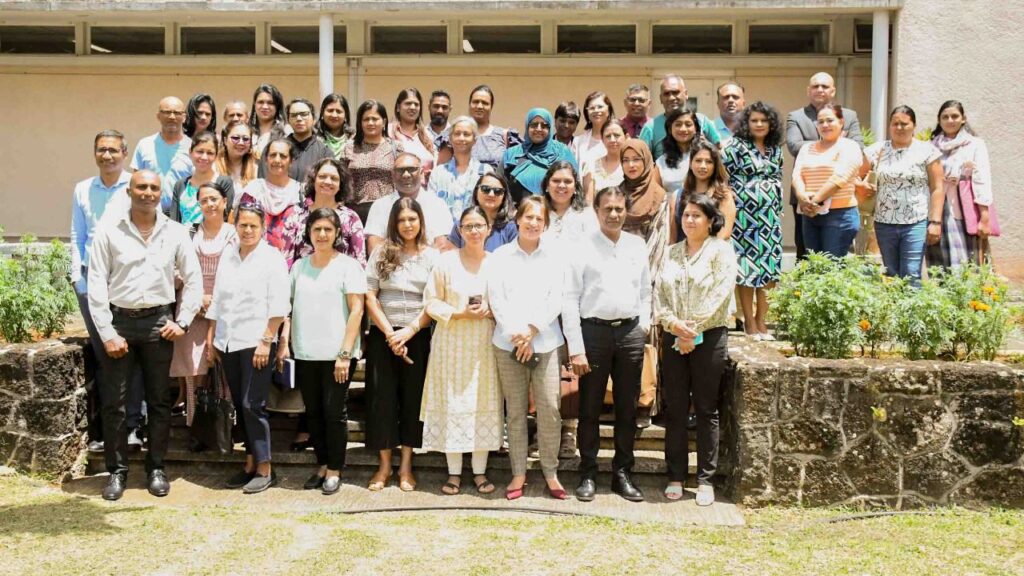
Nepal
During this period, the team of fellows in Nepal has been actively reviewing and adapting the Teacher’s Activity Booklet to include local examples, while also developing reference materials tailored for teachers. To ensure strong support for the teachers involved in the second phase, they organized a consultation on 9 December with district-level education heads and school headteachers, fostering collaboration and alignment with local education leaders.
From 10-15 December, a National Training of Teachers Workshop was held to equip new educators joining the Fellowship program. The workshop brought together 21 teachers from three provinces, along with two municipality education officers, to deepen their understanding of ethics education and prepare them to implement the program effectively in their classrooms.
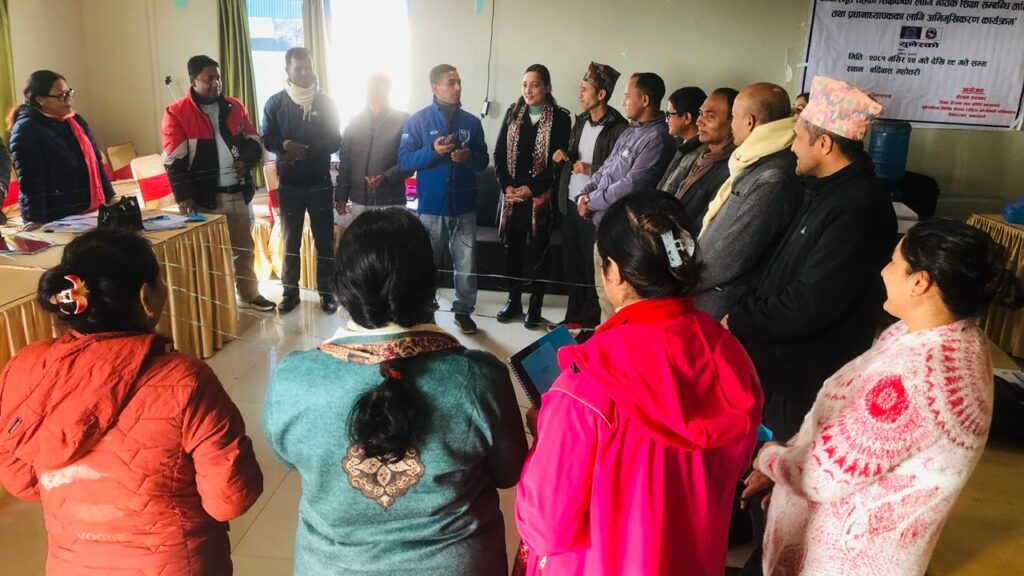
Seychelles
A key highlight of Seychelles’ engagement in the second phase is the integration of Ethics Education into a new Diploma for Teachers, designed to equip educators across the island with the skills to develop and implement ethics education programs in schools. This initiative is being spearheaded by the Department of Curriculum Leadership and Implementation within the Ministry of Education, ensuring a strong foundation for the program’s sustainability.
Throughout this period, a variety of impactful activities were carried out in schools that participated in the first phase, including learners’ and teachers’ circles, a compassion and empathy event, visits to nursing homes for the elderly, and an interfaith gathering for teachers. These activities helped deepen students’ and teachers’ understanding of ethics while promoting values such as empathy, solidarity, and respect.
Looking ahead, the next National Teacher Training Workshop in Seychelles is set for 27-31 January 2025. This workshop will not only strengthen the teachers’ capacity but also extend the program to schools on outlying islands, broadening its reach beyond the mainland.
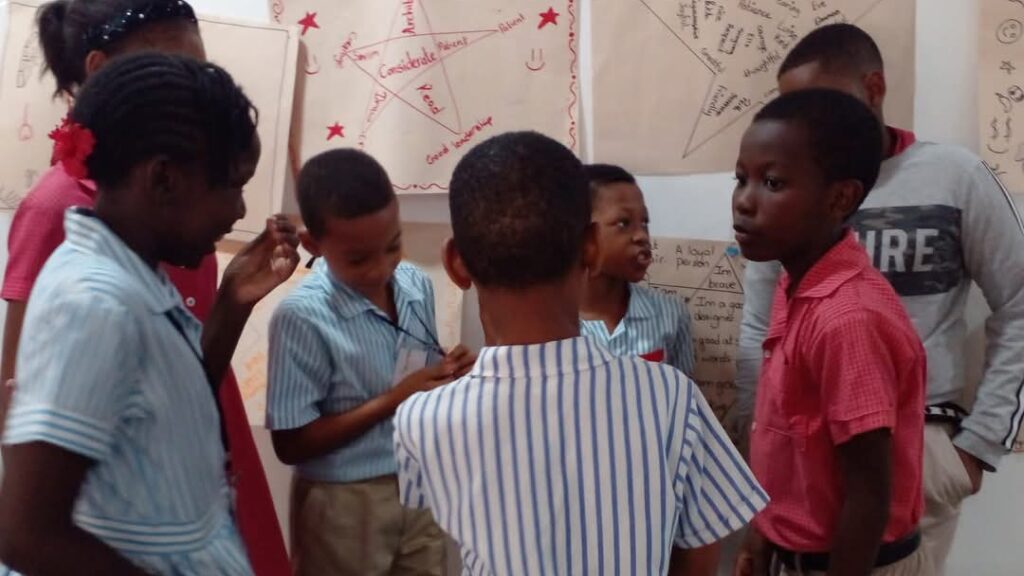
Global Collaboration and Advocacy
In addition to the country-specific progress, several key activities have significantly amplified the program’s impact.
On 23 September, a consultation with 25 learners from participating countries was held in collaboration with the United Nations Office of the High Commissioner for Human Rights (OHCHR) and UNESCO. This consultation gave children a platform to voice their ideas, requests, and concerns regarding the United Nations Human Rights Council Resolution on Ensuring Quality Education for Peace and Tolerance for Every Child. The insights and recommendations gathered from the children have been shared with the OHCHR, offering a vital contribution to shaping policies that reflect the needs and perspectives of those directly affected.
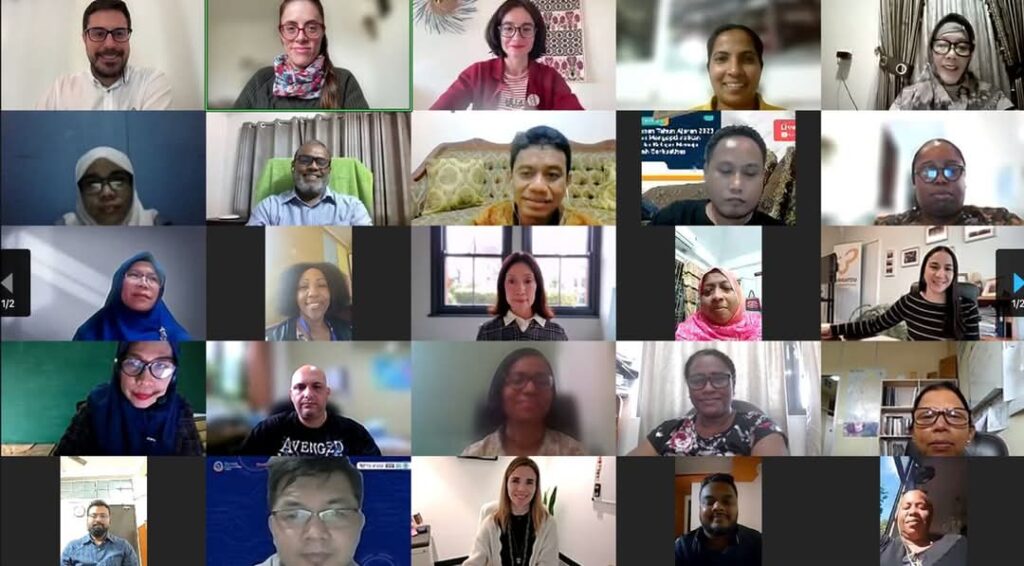
On 27 November 2024, the first Learning Circle of the second phase took place, bringing together 65 participants for an engaging online gathering. Fellows and teachers from across the program shared exemplary practices from their countries, fostering a vibrant space for collaboration, innovation, and mutual learning.
As the second phase progresses, the Ethics Education Fellowship demonstrates the power of ethics education to foster peaceful, inclusive, and resilient communities. Its success across all six countries paves the way for a global movement that is reshaping education.